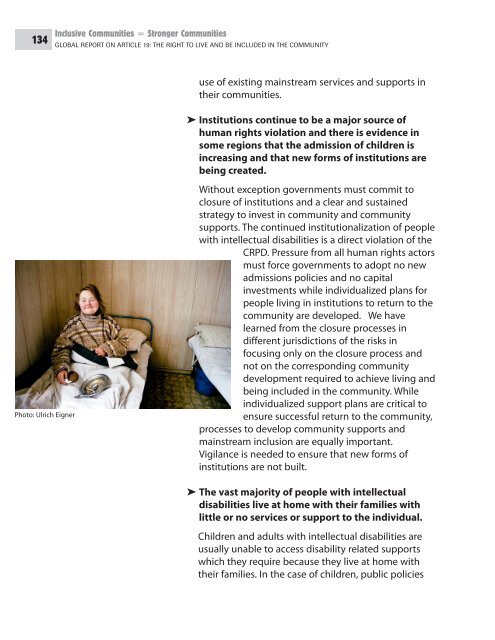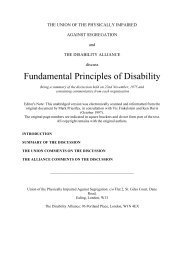Global-Report-Living-Colour-dr2-2
Global-Report-Living-Colour-dr2-2
Global-Report-Living-Colour-dr2-2
Create successful ePaper yourself
Turn your PDF publications into a flip-book with our unique Google optimized e-Paper software.
134<br />
Inclusive Communities = Stronger Communities<br />
GLOBAL REPORT ON ARTICLE 19: THE RIGHT TO LIVE AND BE INCLUDED IN THE COMMUNITY<br />
use of existing mainstream services and supports in<br />
their communities.<br />
‰ Institutions continue to be a major source of<br />
human rights violation and there is evidence in<br />
some regions that the admission of children is<br />
increasing and that new forms of institutions are<br />
being created.<br />
Photo: Ulrich Eigner<br />
Without exception governments must commit to<br />
closure of institutions and a clear and sustained<br />
strategy to invest in community and community<br />
supports. The continued institutionalization of people<br />
with intellectual disabilities is a direct violation of the<br />
CRPD. Pressure from all human rights actors<br />
must force governments to adopt no new<br />
admissions policies and no capital<br />
investments while individualized plans for<br />
people living in institutions to return to the<br />
community are developed. We have<br />
learned from the closure processes in<br />
different jurisdictions of the risks in<br />
focusing only on the closure process and<br />
not on the corresponding community<br />
development required to achieve living and<br />
being included in the community. While<br />
individualized support plans are critical to<br />
ensure successful return to the community,<br />
processes to develop community supports and<br />
mainstream inclusion are equally important.<br />
Vigilance is needed to ensure that new forms of<br />
institutions are not built.<br />
‰ The vast majority of people with intellectual<br />
disabilities live at home with their families with<br />
little or no services or support to the individual.<br />
Children and adults with intellectual disabilities are<br />
usually unable to access disability related supports<br />
which they require because they live at home with<br />
their families. In the case of children, public policies



